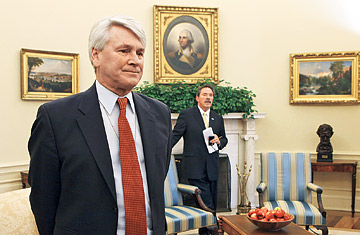
Obama turned to Craig to roll back Bush-era policies in the war on terrorism. But by September, Craig had been sidelined by pragmatists.
(5 of 5)
Obama needed to regain control quickly, and he started by jettisoning liberal positions he had been prepared to accept--and had even okayed--just weeks earlier. First to go was the release of the pictures of detainee abuse. Days later, Obama sided against Craig again, ending the suspension of Bush's extrajudicial military commissions. The following week, Obama pre-empted an ongoing debate among his national-security team and embraced one of the most controversial of Bush's positions: the holding of detainees without charges or trial, something he had promised during the campaign to reject.
To explain these moves, Obama turned to a device he often uses to transcend political divisions: a major speech. Delivered at the National Archives on May 21, Obama's address struck a new equilibrium between security and civil liberties--a stark contrast to the security-at-any-cost approach advocated by Cheney, but also a departure from his direction at the start of 2009. The President pointed out that he had ended "enhanced interrogation" and closed the CIA's secret prisons. But he also pledged to "use all elements of our power to defeat" al-Qaeda.
Obama's Archives speech is now the template for Administration policy. Attorney General Holder recently announced that the U.S. would prosecute 10 Guantánamo detainees, including Khalid Sheikh Mohammed and four other plotters of the 9/11 attacks. But he also announced, to the chagrin of human-rights groups, that five other Guantánamo detainees would go before the military commissions Obama had shunned in his campaign but embraced in May. Obama will soon announce that detainees will face indefinite detention.
Craig watched the Archives speech from the second row--close enough to see the writing on the wall. Emanuel had assigned Pete Rouse, a top adviser, to oversee the political side of Craig's old domain and Donilon to chair an interagency group on policy. Craig continued to attend the meetings but said little, according to participants. Administration officials began to whisper about Craig's prospects in August.
Obama announced his intention Nov. 13 to replace Craig with Bob Bauer, whose specialty is election law. In his resignation letter to Obama, Craig wrote, "I want to tell you how proud I am of all that your legal team has accomplished on your behalf and in support of your agenda since your Inauguration." For Craig, however, the agenda had changed.
